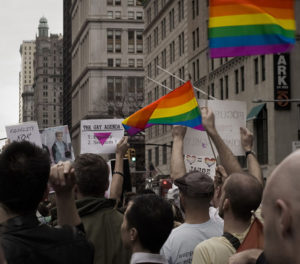|
Listen to this Article
|
In 1964, Congress enacted a civil rights law prohibiting discrimination in numerous areas, including in employment. The section prohibiting employment discrimination, known as Title VII, protected employees from not being hired, being fired, and not being promoted because of their race, color, religion, sex or national origin.

This shift began in the early 2000s, but was limited at first. Courts held that Title VII prohibited some forms of anti-LGBT discrimination, but only where the employee faced discrimination because they were “too feminine” or “too masculine” because of their orientation. For example, In Rene v. MGM Grand Hotel, Inc., 305 F.3d 1061 (9th Cir. 2002), the federal Court of Appeals for the Ninth Circuit considered a case where coworkers harassed a gay man by routinely calling him “sweetheart,” and touching him “like they would . . . a woman,” because of his sexual orientation. The court held that this constituted prohibited sex discrimination. In agreeing with the majority’s opinion, three of the judges explained that Title VII applied because the conduct constituted gender stereotyping. Likewise, in Nichols v. Azteca Restaurant Enterprises, Inc., 256 F.3d 864 (9th Cir. 2001), the Ninth Circuit determined that routinely referring to a gay employee by female pronouns and mocking him for walking “like a woman” constituted illegal gender stereotyping.
Yet courts have long insisted upon a distinction between the gender stereotyping discrimination in Rene and Nichols and discrimination generally on the basis of sexual orientation. In 2003, the Seventh Circuit determined that harassment because of coworkers’ perceptions of an employee’s sexual orientation—but not his failure to conform to gender-based stereotypes—was not prohibited by Title VII. As recently as March of 2017, the Eleventh Circuit, in Evans v. Georgia Regional Hospital, 850 F.3d 1248 (11th Cir. 2017), rejected an employee’s claim that sexual orientation discrimination is a type of sex discrimination.
Only in the past few years have courts begun to change their tune. This year, the Second Circuit held that sexual orientation discrimination is inherently sex discrimination. In Zarda v. Altitude Express, Inc., No. 15-3775, 2018 WL 1040820 (2d Cir. Feb. 26, 2018), the court ruled that: (1) sexual orientation discrimination is sex discrimination because it is inherently a “function of sex” because “one cannot fully define a person’s sexual orientation without identifying his or her sex”; (2) sexual orientation discrimination is illegal gender stereotyping because when “an employer acts on the belief that men cannot be attracted to men, the employer has acted on the basis of gender” and that “same-sex orientation represents the ultimate case of failure to conform to gender stereotypes”; and (3) sexual orientation discrimination is sex discrimination because it discriminates on the basis of a person’s decision to “associate” with someone of the same sex.
In that same case, another judge wrote a terse concurring opinion: “[The plaintiff’s] sexual orientation is a function of his sex. Discrimination against [the plaintiff] because of his sexual orientation therefore is discrimination because of his sex, and is prohibited by Title VII. That should be the end of the analysis.”
Courts also resisted recognizing Title VII protections for transgender employees for many years. In Holloway v. Arthur Anderson, 566 F.2d 659 (9th Cir. 1977), the Ninth Circuit rejected a transgender employee’s Title VII claim, reasoning that discrimination against transgender people is discrimination on the basis of gender, which it said was not protected by Title VII, instead of on the basis of sex, which is protected.
By the 2000s, however, the tide began to turn. In Schwenk v. Hartford, 204 F.3d 1187 (9th Cir. 2000), the Ninth Circuit court suggested that discrimination against transgender people was both gender discrimination and sex discrimination, and that both were prohibited under Title VII. Moreover, it indicated that gender identity discrimination was itself a form of gender stereotyping because identifying as a transgender person necessarily entails an “assumption of a feminine rather than a typically masculine appearance or demeanor,” or vice versa. Though there is still no firm consensus, many other federal courts have adopted the Ninth Circuit’s analysis.
Despite decades of resistance, a growing number of federal court decisions have indicated an emerging consensus that federal law prohibits both sexual orientation and gender discrimination. Some courts have resisted this trend but it seems that LGBT people will soon be able to vindicate their right to be free of discrimination, under Title VII, everywhere in the United States.
Editors’s Note: If you live or work in the San Francisco Bay Area and feel that you may be experiencing LGBT discrimination issues, please reach out to one of our attorneys with expertise in LGBT discrimination. We’re known as one of the top law firms in San Francisco and all of the Bay Area for discrimination issues, including wrongful termination or sexual harassment. Therefore, your best next step is to reach out for a confidential consultation. With offices in San Anselmo and Oakland, we’re convenient to both Marin County and the East Bay. For those who live in San Francisco or other parts of the Bay Area, we can first consult over the phone or via Web conference, and then decide whether to move forward. Our attorneys will strive to make the process as easy and as confidential as possible at each step of the way.


